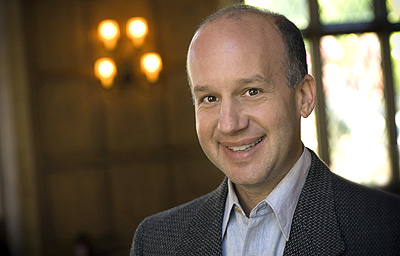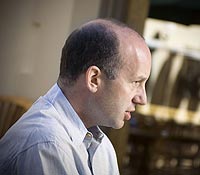UC Berkeley Web Feature
 |
Berkeley alum Daryl Ross in the main dining room of Adagia, his latest eatery near or on the Berkeley campus. Adagia opened in February in the former multipurpose room of Westminster House, a Presbyterian ministry that renovated the 1927 building to house students and Adagia. (Bart Nagel photos) |
'A beacon for other businesses': Berkeley alum Daryl Ross takes budget organic mainstream
BERKELEY – Daryl Ross may have completed his bachelor's degree at UC Berkeley in 1985, after the standard four years, but in all the ways that count, he's never left.
Ross operates five eateries on or near campus: the Free Speech Movement Café in Moffitt Library, Boalt Hall's Café Zeb, the Berkeley Art Museum's Café Muse, Caffè Strada just east of BAM on Bancroft Way at College Ave., and Adagia, his first full-service restaurant, which opened next to Strada on Bancroft in February. All are extremely popular with students, faculty and staff for their combination of low-key ambience and carefully prepared, mostly organic food at budget prices. (For more on Café Muse, see the Berkeleyan's 2004 article, "What’s not cooking in Berkeley?")
"I have always thought food places should have more significance than just delivering food. They're places where community develops," says Ross. At Strada, his first (and, he admits, still his favorite) business, "you'll see Nobel laureates holding informal office hours next to teenagers with skateboards. That to me is the essence of Berkeley."
Born to be a Bear
Both Berkeley and good food have been present in Ross's life for almost as long as he can remember. His older sister attended Berkeley in the late '60s - "she had that whole experience of being gassed by [then-Governor] Ronald Reagan," Ross recalls - followed by Ross's older brother in the '70s. The next decade, it was Ross's turn. He never considered going elsewhere.
"Cal was in the family," he shrugs. "I liked hanging out in Berkeley, the city and the energy here. It epitomized college for me."
At Berkeley, Ross studied philosophy, concentrating on classical thinkers like Aristotle and Plato. He chose his major not because it was well-suited to coffee-shop discussions, but because it embodied "what undergraduate education should be - learning to love knowledge and what was out in the world," he explains. He was not a particularly dedicated student, he admits, always looking forward to when he would be done with school and out in the business world.
Following graduation and a stint in Russia as an amateur filmmaker, in 1989 Ross opened Caffè Strada, the bustling coffee and pastry shop on Bancroft Way, with the help of his parents. (The family lived in Menlo Park, but his father had owned the Strada property and the adjacent Bancroft Hotel since 1979.) Like Berkeley, food also ran in the family. His mother was an excellent cook, and his father, in addition to buying and selling clothes wholesale, operated several fast-food-type stands throughout the '70s in the Bay Area.
Among them were a frozen-yogurt stand, a jellybean stand, and an Orange Julius, an early juice-and-smoothie franchise. Apparently, the Orange Julius chain had very strict, cost-conscious recipes that franchisees were supposed to follow, but Ross's father was always "subversively substituting high-end hot dogs and fresh orange juice, which would get him in trouble [with the franchise overseers]. But quality was more important to him than the bottom line."
Ross cress for less?
It's a philosophy Ross shares. The food at Café Muse, the lunchtime destination for Berkeley staffers and museum patrons alike that Ross opened in 2003, was named "Most Affordable California Cuisine" this year by the East Bay Express. The weekly newspaper noted gleefully that nothing on Muse's menu costs more than $8, even though most of the ingredients are organic, free-range, and/or sustainably grown - i.e., pricey.
 'I want to open people's eyes to what's behind food: the implications of what you buy, of food that has to be trucked across America using oil, of pesticides and their health effects. But here's the conundrum: as much as I want to inform, I don't want to preach.' -Daryl Ross |
In his place, others might raise prices, or perhaps switch over to cheaper produce grown with pesticides. Neither move is acceptable to him. "My business is about making this kind of food accessible to everyone, " he says. And by everyone, he includes students. He wants his new restaurant, Adagia, to be more than "just for special occasions, like Chez Panisse."
Although Adagia often buys from the same suppliers as that Berkeley gastronomic temple, all of its dinner entrees - including duck confit and grassfed Montana beef - are less than $20. Most of the wine list, which emphasizes French and Italian wines, is priced at under $30. To keep Adagia's prices so low, Ross has cut corners where he can. There are no tablecloths on the handsome wood tables (all made from reclaimed lumber), obviating laundering costs - and reducing the quantity of harmful chemicals, like bleach, that Adagia contributes to the environment.
Ross is quick to note that he considers Chez Panisse an inspiration, not competition. He met Chez Panisse founder and renowned chef Alice Waters in 2002, when he was creating the Free Speech Movement (FSM) Café on campus. Waters, who is also a Berkeley alum, is a friend of Steve Silberstein, the Berkeley Free Speech Movement veteran whose gift to the university funded the café. She opened Ross's eyes to the importance of using produce from local farmers who practice organic, sustainable methods.
"Alice gave me a whole new definition of quality," says Ross of the experience. "Until then, I hadn't thought enough about how food fit into the ecosystem. Quality, organic, sustainable ingredients not only taste better, they're better for the world all around."
In his review for the San Francisco Chronicle, restaurant critic Michael Bauer praised the inventive and nutritious entrees - "each plate is so carefully composed that it looks as if the chef keeps a copy of the new food pyramid above his station as a reminder to choose from all of the groups," he wrote - without ever mentioning that most were organic. That's because it's possible to eat a delicious meal at Adagia and never know that you're part of a culinary environmental movement . After writing a multi-paragraph description of Adagia's food philosophy for the restaurant's opening, Ross jettisoned it in favor of a terse sentence in small type on the side of the menu. It reads: "Join our table: Adagia uses organic and sustainable ingredients whenever possible."
Why not advertise that the beef is from Montana's Meyer Ranch and the pork from Marin County's Niman Ranch, as other Berkeley restaurants would? Ross winces. "When you gratuitously throw brand names on the menu, you're shaping the experience into something else," he says. "Yes, I want to open people's eyes to what's behind food: the implications of what you buy, of food that has to be trucked across America using oil, of pesticides and their health effects. But here's the conundrum: as much as I want to inform, I don't want to preach."
He is also aware that students, in particular, tend to be less concerned with how their sandwich meat was raised than how much it costs. At the Free Speech Movement Café, he experimented with using milk from Straus Family Creamery, an organic dairy in Marin County. The significantly higher priced milk did not inspire more student consumption. "With students, you're fighting against distraction. Students are here to study, and food is just a necessary thing to most of them," he shrugs. After a few months, Ross resignedly switched back to regular milk at the FSM Café.
Even Adagia, the highest priced of all his eateries - designed not for students but also designed not to exclude them - uses some non-organic foods. Some ingredients are so expensive out of season that Ross has to switch back to their more widely available, non-organic counterparts. "I'd love for Adagia to go 100 percent organic," he says. "But I don't think it's possible for us to do so all the time and keep our prices affordable."
Eat yours green
Yet Ross will attempt to do just that with a new campus venture that he is developing in partnership with the Associated Students of the University of California, UC Berkeley's student government organization. The Green Café will use all sustainably grown, recycled or reclaimed materials. Even the cleaning solutions will be environmentally friendly. "I want it to epitomize how businesses should be in the 21st century," says Ross. "Businesses in general and restaurants in particular are extremely wasteful."
He has tapped professors and students from Berkeley's architecture school for designs and lists of "green" building materials, lobbied the Haas business school to develop sustainable business models, and actively solicited ideas from student conservation groups. If all goes smoothly - and it almost never does in Berkeley - the Green Café could be open by fall 2006 in the southeast corner of the Martin Luther King, Jr. Student Union, where Telegraph Ave. dead ends into Bancroft. Right now, it's a mostly empty space with information kiosks and a stairway up to the Pauley Ballroom.
Ross is thrilled with the location's visibility. "Berkeley can't have some generic chain shop at its gateway. That's not what Berkeley is about," he says, his usually mild manner turning passionate. "Berkeley is about the progressive nature of what's possible. The Green Café plugs into what Cal gave me: a perspective on how to change the paradigm, to see how far you can take these models. We want to be a beacon for other businesses."

